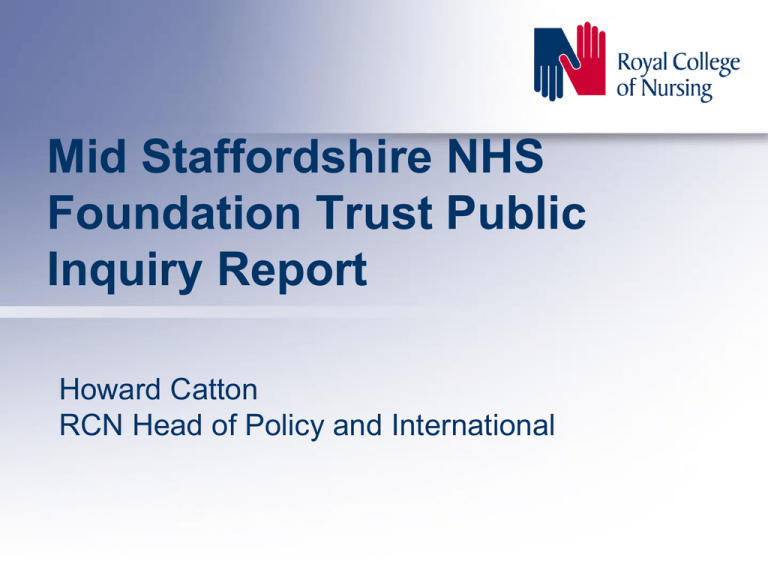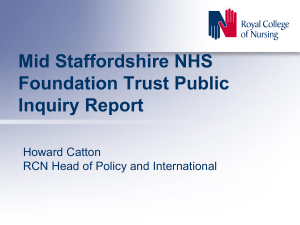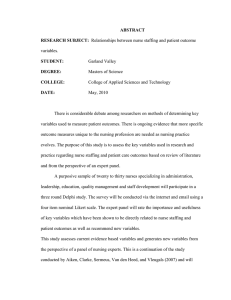Mid Staffordshire NHS Foundation Trust Public Inquiry Report Howard Catton
advertisement

Mid Staffordshire NHS Foundation Trust Public Inquiry Report Howard Catton RCN Head of Policy and International Context In June 2010 Sec of State launched full public inquiry into Mid Staffordshire Foundation NHS Trust Inquiry chaired by Robert Francis QC Terms of reference: “to examine the operation of the commissioning, supervisory and regulatory organisations and other agencies, including the culture and systems of those organisations in relation to their monitoring role at Mid Staffordshire NHS Foundation Trust between January 2005 and March 2009 and to examine why problems at the Trust were not identified sooner, and appropriate action taken” 290 recommendations 3 volumes 164 witnesses gave oral evidence Robert Francis Press Conference Statement 6/2/13 “We need a patient centred culture, no tolerance of non compliance with fundamental standards, openness and transparency, candour to patients, strong cultural leadership and caring, compassionate nursing, and useful and accurate information about services” “The Trust Board was weak. It did not listen sufficiently to its patients and staff or ensure the correction of deficiencies brought to the Trust’s attention. It did not tackle the tolerance of poor standards and the disengagement of senior clinical staff from managerial and leadership responsibilities. These failures were in part due to a focus on reaching targets, achieving financial balance and seeking foundation trust status at the cost of delivering acceptable standards of care” “Conventionally, some might say depressingly, when a disaster has occurred in the NHS the usual approach has been to blame and sack individuals or to propose major reorganisations. What has been found to be wrong here cannot be cured by finding scapegoats, and/ or recommending major reorganisations yet again” Key themes of the recommendations Putting the patient first Common culture Standards of service Professional regulation of fitness to practice Regulating healthcare systems Complaints handling Performance management Medical training and education Openness, transparency and candour Nursing Leadership 290 recommendations in total Health care support workers A registration system should be created under which no unregistered person should be permitted to provide for reward direct physical care to patients currently under the care and treatment of a registered nurse or a registered doctor (or who are dependent on such care by reason of disability and/or infirmity) in a hospital or care home setting. The system should apply to healthcare support workers There should be a national code of conduct for healthcare support workers There should be a common set of national standards for the education and training of healthcare support workers The code of conduct, education and training standards and requirements for registration for healthcare support workers should be prepared and maintained by the NMC “The Government intends to create a voluntary rather than a compulsory register. A voluntary register has little or no advantage for the public” Leadership “It is important that the strength of the nursing voice is not diminished by the transfer of the post of Chief Nursing Officer to the NHS Commissioning Board. That voice could be further strengthened by a requirement that all organisations in the healthcare system for which nursing issues are relevant had the advantage of a nurse at board level” “They also need to ensure that each patient has at all times a named key nurse who is responsible for coordinating the nursing and ancillary care provided to each patient. The named key nurse on duty should also, wherever possible, be present for those parts of ward rounds concerning his or her patients” Ward nurse managers should operate in a supervisory capacity, and not be office-bound or expected to double up, except in emergencies as part of the nursing provision on the ward Training and continuing professional development for nurses should include leadership training at every level from student to director The leadership required for the delivery of excellent nursing care should be recognised and incentivised in the remuneration structure The Knowledge and Skills Framework should be reviewed with a view to giving explicit recognition to nurses’ demonstrations of commitment to patient care Culture A statutory obligation should be imposed to observe a duty of candour The NHS Constitution should include reference to all the relevant professional and managerial codes by which NHS staff are bound, including the Code of Conduct for NHS Managers Healthcare providers should be required to have their quality accounts independently audited Impact and risk assessments should be made public, and debated publicly, before a proposal for any major structural change to the healthcare system is accepted System regulation To create a single regulator to monitor against fundamental standards which link back to common values for the service (as set out in the NHS Constitution). These fundamental standards to be developed collaboratively and be meaningful to patients and staff and will include governance and the fitness of Board members. They will be monitored by looking at indicators developed by NICE, to include staffing Monitoring will be crucially linked to inspections on the ground as well as making better use of information already in the system (e.g. complaints) New role of a Chief Inspector of Hospitals announced by the Prime Minister (to sit within CQC) Failure to comply will not be accepted; those who are found not to be meeting fundamental standards will no longer provide services with the potential for criminal sanctions Staffing levels Recommends stronger guidance for setting safe staffing levels built into the new regulatory arrangements Evidence based guidance to be created by NICE after appropriate input from specialities, professional organisations, patient and public representatives, and consideration of the benefits and value for money of possible staff to patient ratios. This should include nursing staff on wards. CQC should police the compliance of providers with these fundamental standards The NHS Litigation Authority will set requirements for Trusts to have regard to these staffing tools and guidance, and also adequately assess risk before implementing new staffing Provider boards must consult their clinical and nursing directors when staffing levels are changed and record their responses. Commissioners must write this requirement into contracts “Evidence to this Inquiry suggested that the Trust did not have available to it reliable figures for its nursing establishment, either in theory or in practice... What is clear is that the numbers had always been tight and declined during the period with which the Inquiry is concerned” How staffing level standards could be determined and enforced: NHS Constitution Standards NHS Litigation Authority NICE Single regulator Providers & Commissioners “The procedures and metrics produced by NICE should include evidence-based tools for establishing the staffing needs of each service. These measures need to be readily understood and accepted by the public and healthcare professionals” Nursing There should be an increased focus in nurse training, education and professional development on the practical requirements of delivering compassionate care in addition to the theory There should be a national entry-level requirement that student nurses spend a minimum period of time, at least three months, working on the direct care of patients under the supervision of a registered nurse The NMC, working with universities, should consider the introduction of an aptitude test to be undertaken by aspirant registered nurses at entry into the profession, exploring, in particular, candidates’ attitudes towards caring, compassion and other necessary professional values The Department of Health and NMC should introduce the concept of a Responsible Officer for nursing, appointed by and accountable to, the NMC Without introducing a revalidation scheme immediately, the NMC should introduce common minimum standards for appraisal and support with which responsible officers would be obliged to comply. They could be required to report to the NMC on their performance on a regular basis As part of a mandatory annual performance appraisal, each nurse, regardless of workplace setting, should be required to demonstrate in their annual learning portfolio an up-to-date knowledge of nursing practice and its implementation Role of RCN “At Stafford, the RCN was ineffective both as a professional representation organisation and as a trade union ” “The evidence reviewed in this report suggests that the RCN has not been heard as might have been expected in pursing professional concerns about standards of care” Chapter 23 on nursing “There is an inherent conflict between the professional representative and trade union functions of the RCN which may diminish the authority of its voice on professional issues” Specific recommendation 201: “The RCN should consider whether it should formally divide its “Royal College” functions and its employee representative/trade union functions between two bodies rather than behind internal “Chinese walls” Next steps Government to respond within one month All commissioning, service provision regulatory and ancillary organisations in healthcare have to consider the findings/ recommendations of the report and decide how to apply them to their own work Each of these organisations must announce “at the earliest practicable time” their decision on whether they accept the recommendations and what they intend to do to implement those accepted, and after that, on a regular basis but not less than once a year, publish in a report information regarding the progress in relation to its planned actions The House of Commons Health Select Committee will review the performance of organisations taking actions with regard to the recommendations in the report What are your views? Please send your comments to policycontacts@rcn.org.uk


